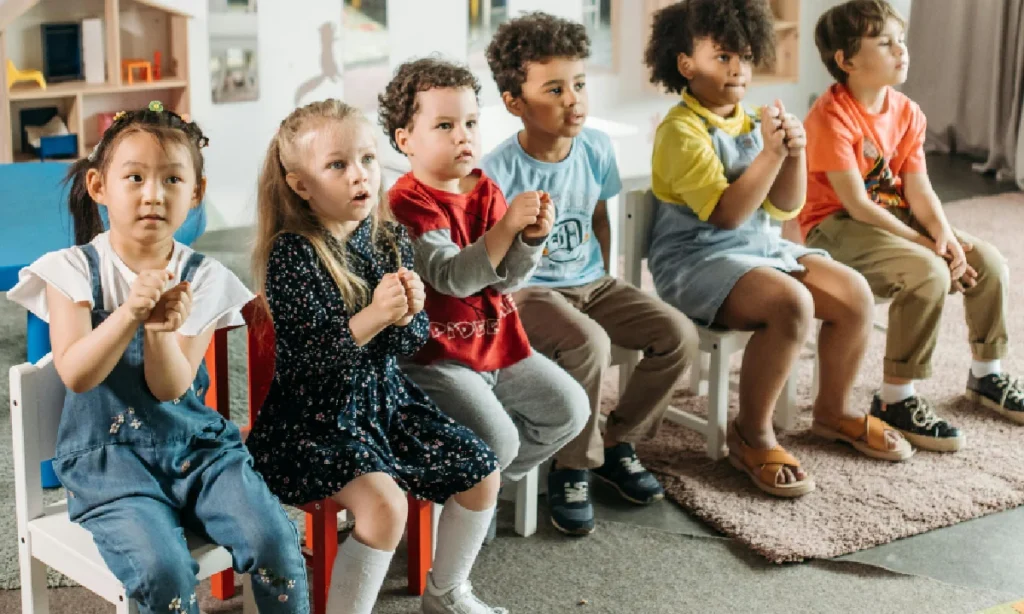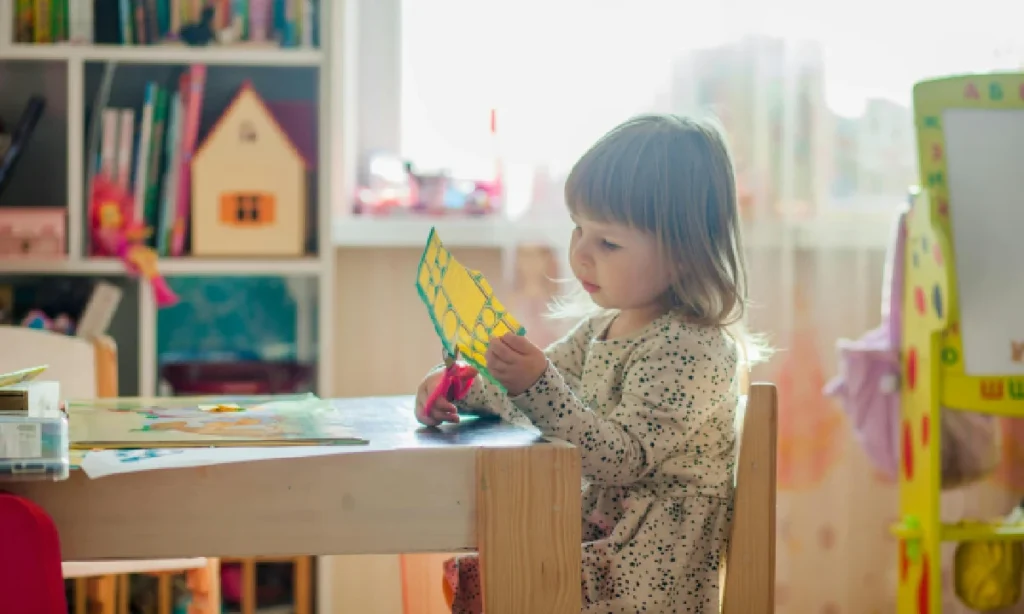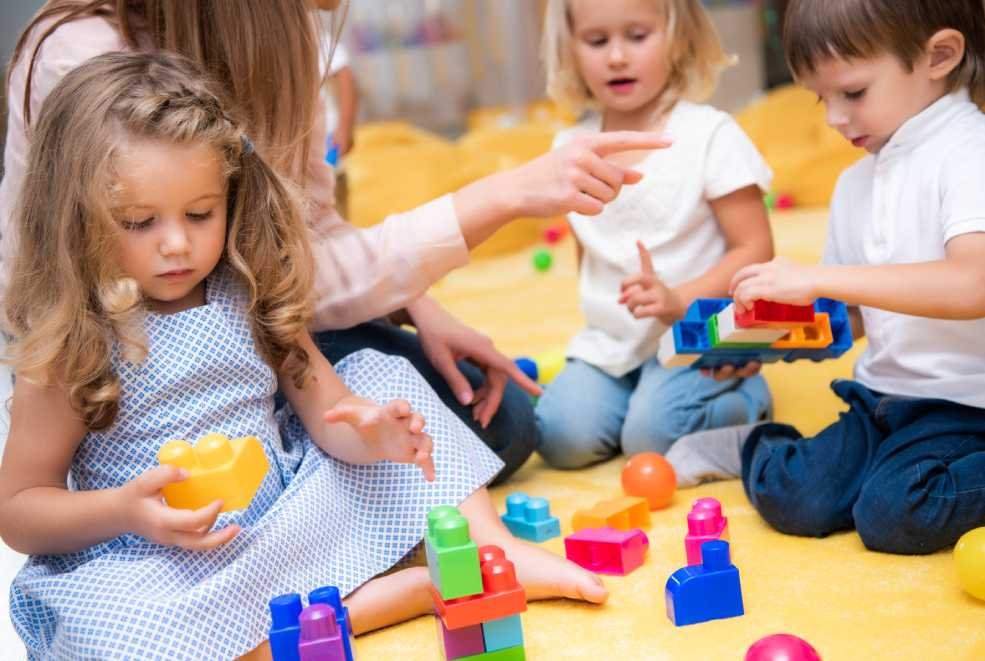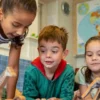![From Playtime to Prime Time: How Hermitage Hills Day School Shapes Bright Futures Introduction: The Critical Role of Early Childhood Education The early years of a child’s life are not merely a prelude to formal education—they are its most vital chapter. During this […]](https://dayschools.org/hermitage/wp-content/uploads/sites/5/2023/07/Hermitage-Hills-Day-School-16.jpg)
Table of Contents
Introduction: The Critical Role of Early Childhood Education
The early years of a child’s life are not merely a prelude to formal education—they are its most vital chapter. During this brief but powerful stage, the brain undergoes rapid growth, forming over a million new neural connections per second. It is a time of unparalleled neuroplasticity, where experiences become the building blocks of cognitive, emotional, and social development. What a child is exposed to during this time—positive relationships, enriching environments, and intentional learning—can influence the trajectory of their entire life.
Hermitage Hills Day School understands that early education is not a passive process. It is a strategic, deliberate investment in a child’s future. With a curriculum shaped by developmental science and a culture anchored in compassion, the school provides a rich ecosystem where children are empowered to explore, discover, and thrive. By combining structured learning opportunities with the freedom to play and express, Hermitage Hills Day School cultivates the foundational skills that prepare children not just for kindergarten, but for a lifetime of learning, leadership, and well-being.
In this setting, education is not transactional—it is transformational. Children learn to think critically, communicate confidently, and develop the self-awareness that underpins emotional resilience. Hermitage Hills Day School’s approach is a clear affirmation that what happens in the earliest classrooms can have the most enduring impact.
Foundational Philosophy: Educating the Whole Child
At Hermitage Hills Day School, education begins with a comprehensive understanding of what it means to truly support a child. Academic success is important—but not at the expense of emotional health, social competence, or physical well-being. The school’s guiding philosophy is rooted in the conviction that every child is a complete human being from the very beginning, and thus should be nurtured intellectually, emotionally, socially, and physically in equal measure.
This whole-child approach informs every decision, from classroom design to daily routines. Learning environments are intentionally crafted to be both stimulating and soothing—spaces where curiosity is sparked and safety is felt. Rich sensory materials, age-appropriate challenges, and thoughtful provocations invite children to explore concepts across domains: literacy, numeracy, science, art, and beyond.
Equally important is the school’s emphasis on emotional grounding. Teachers foster secure attachments with their students, creating the trust necessary for risk-taking and deep engagement. Children are taught not just what to learn, but how to navigate emotions, build relationships, and understand their own strengths and challenges.
Social interaction is encouraged and guided with intention. Children engage in cooperative play, group projects, and shared problem-solving—laying the foundation for empathy, collaboration, and civic-mindedness. Meanwhile, physical development is nurtured through daily movement, hands-on tasks, and health-conscious practices that build both motor skills and lifelong wellness habits.
By seeing and supporting each learner as a whole person, Hermitage Hills Day School creates an environment where children flourish in every dimension of development. This integrated approach ensures that learning is not confined to academics—it is expansive, enriching, and enduring.

The Power of Play: Transforming Exploration into Cognitive Growth
Play is often mistaken for a frivolous pastime in the educational setting—something to be reserved for recess or downtime. At Hermitage Hills Day School, it is anything but. Play is recognized as the essential architecture of early cognitive development. It is in these moments of joyful, unstructured, and imaginative activity that children engage in the deepest kind of learning—learning that is self-motivated, exploratory, and layered with meaning.
Here, play is far from random; it is thoughtfully curated by educators who understand its transformative potential. Classroom centers are equipped with open-ended materials—blocks, sensory tables, dramatic play areas, art supplies—that serve as springboards for hypothesis testing, decision-making, and strategic thinking. When a child builds a bridge from loose parts, they’re not just constructing—they’re planning, troubleshooting, and adjusting. These are the very foundations of engineering and problem-solving.
Language acquisition also thrives in playful contexts. Story-driven games, puppet shows, and cooperative narratives foster rich vocabulary, sequencing skills, and the mechanics of conversation. Executive functioning—the mental skillset responsible for attention control, flexible thinking, and working memory—is exercised with every negotiation in pretend play or rule-based group activity.
Educators at Hermitage Hills Day School observe closely, extending children’s play with intentional prompts and guided questions. This balance of autonomy and subtle scaffolding transforms ordinary play into a catalyst for academic growth, turning discovery into a deliberate act of learning.
Social Development: Building Empathy, Cooperation, and Confidence
Human beings are inherently social creatures, and the ability to relate to others with empathy and understanding is as crucial to a child’s development as literacy or numeracy. At Hermitage Hills Day School, the social curriculum is as robust as the academic one. The classroom operates as a miniature society where children learn to engage with others, respect differences, and collaborate toward common goals.
Children participate in daily activities that require negotiation, turn-taking, and group problem-solving. These interactions, though small in scale, develop essential interpersonal skills that will serve them for a lifetime. Whether it’s sharing materials during a building activity or navigating the dynamics of a group game, children learn the give-and-take of healthy relationships.
Educators model and reinforce constructive communication, helping children articulate their thoughts with clarity and kindness. They teach the art of active listening and support children in resolving conflicts independently, using strategies such as “I” statements, calm-down corners, and restorative dialogue.
Importantly, these social experiences are infused with a deep respect for individuality. Differences in culture, language, ability, and perspective are not only acknowledged—they are celebrated. This nurtures a culture of inclusion where every child feels seen, valued, and empowered to contribute. Over time, children develop confidence in their social identities and gain a sense of belonging that enhances every aspect of their educational journey.
Emotional Resilience: Fostering Self-Regulation and Self-Awareness
In a world where emotional well-being is increasingly recognized as central to success and happiness, Hermitage Hills Day School places emotional intelligence at the heart of its pedagogy. Emotional resilience—the ability to manage emotions, recover from setbacks, and adapt to change—is a skill taught with the same deliberation as reading or math.
The journey begins with self-awareness. Children are taught to recognize and name their feelings using developmentally appropriate tools such as emotion charts, social stories, and mindfulness activities. These practices help students understand the complex language of emotion and give them the vocabulary needed to express themselves authentically and constructively.
Rather than suppress or bypass challenging emotions, educators at Hermitage Hills Day School lean into them. When a child is overwhelmed or frustrated, teachers respond with calm, empathic support, guiding the child through the experience instead of around it. This approach normalizes emotional intensity and teaches students that feelings are manageable, not shameful.
Techniques such as breathing exercises, guided reflection, and positive affirmations are introduced early, equipping children with lifelong tools for self-regulation. Classroom routines also incorporate space for emotional decompression and quiet reflection, acknowledging the diverse emotional rhythms of young learners.
By building emotional intelligence from the ground up, Hermitage Hills Day School empowers children to navigate life with empathy, adaptability, and inner strength—qualities that will support them long after they leave the classroom.

Physical Literacy: Enhancing Motor Skills and Healthy Habits
At Hermitage Hills Day School, physical development is not an afterthought—it is a core element of the educational experience. Recognizing that movement is intimately tied to cognitive and emotional growth, the school integrates physical activity into every aspect of the day. This intentional approach supports the development of both gross and fine motor skills while fostering a foundation for lifelong health and well-being.
Children are offered frequent opportunities for large-movement play, from running and climbing outdoors to engaging in yoga, dance, and obstacle courses that challenge balance, strength, and coordination. These activities are not only energizing—they also enhance body awareness, spatial orientation, and self-control. Fine motor skills are equally emphasized through classroom activities such as painting, tracing, threading, and manipulating small objects, all of which build dexterity and prepare young hands for writing and self-care tasks.
Beyond movement, Hermitage Hills Day School introduces children to essential wellness concepts. Simple, age-appropriate lessons on nutrition, hydration, hygiene, and rest instill a sense of responsibility for one’s body. Mealtime becomes a moment for learning about healthy food choices, while routines such as handwashing and toothbrushing are modeled and reinforced daily.
In cultivating physical literacy from an early age, Hermitage Hills Day School ensures that children not only move with confidence but also understand the value of caring for their physical selves—an empowering lesson that endures throughout life.
Differentiated Instruction: Honoring Individual Learning Journeys
No two learners are alike. At Hermitage Hills Day School, this fundamental truth is celebrated through a dynamic, differentiated instructional model. Each child is viewed as a unique individual with specific interests, strengths, and developmental needs. As such, the curriculum is designed not as a rigid path but as a flexible framework that adapts to each learner’s journey.
Teachers engage in continuous observation, using both formal assessments and informal insights to inform their instructional strategies. This responsive approach allows them to tailor content, modify pacing, and adjust support levels to align with the child’s readiness. For example, one student may explore early numeracy through hands-on manipulatives, while another delves into abstract number concepts through storytelling or pattern games.
Learning modalities are also taken into account—visual, auditory, kinesthetic, and tactile preferences are recognized and integrated into lesson planning. The result is an environment where each child feels seen, challenged, and supported. Success becomes a personal milestone, not a comparative measure, fostering intrinsic motivation and deep engagement.
This commitment to personalized education instills a strong sense of self-efficacy. Children grow not only in knowledge but in confidence, resilience, and a love for learning that transcends the classroom.
STEAM Integration: Cultivating Curiosity and Innovation from the Start
Innovation doesn’t begin in high school robotics labs or college science courses—it starts with cardboard, curiosity, and a question as simple as “Why does this happen?” Hermitage Hills Day School understands the transformative power of early exposure to STEAM—Science, Technology, Engineering, Arts, and Mathematics—and weaves these disciplines seamlessly into its early childhood curriculum.
STEAM at Hermitage Hills Day School is hands-on, interdisciplinary, and grounded in real-world relevance. Children might build ramps to study motion, observe insects to learn about ecosystems, or use tablets to create digital art. These activities are designed not just to impart knowledge, but to spark inquiry, encourage experimentation, and inspire wonder.
The inclusion of the arts within this framework is intentional and essential. Creative thinking, visual expression, and storytelling enrich the scientific and mathematical experience, allowing children to approach problems from multiple perspectives. Artistic exploration complements logical reasoning, fostering both divergent and convergent thinking.
Technology is used not as a substitute for active learning, but as a tool for creation and discovery. Age-appropriate digital tools support learning through interactive experiences that encourage exploration and reinforce conceptual understanding.
Through this early and holistic exposure to STEAM, Hermitage Hills Day School equips students with the intellectual agility, curiosity, and confidence they will need to navigate and shape a rapidly evolving world. The seeds of tomorrow’s scientists, designers, and innovators are sown right here, in a classroom that views every question as the beginning of a breakthrough.

Educator Excellence: Empowering Growth Through Expertise
A school is only as strong as the educators who shape its daily rhythms—and at Hermitage Hills Day School, those educators are nothing short of exceptional. The faculty is composed of professionals who bring not only credentials and expertise in early childhood education, but also a profound commitment to nurturing the whole child. Their role extends far beyond instruction; they serve as mentors, guides, advocates, and co-learners.
Each educator at Hermitage Hills Day School is deeply versed in the developmental milestones of early childhood. Their understanding of pedagogy is matched by an ability to translate theory into practice—crafting engaging lessons that are as developmentally appropriate as they are academically enriching. They recognize the nuances of young learners: when to intervene, when to observe, and when to simply let a moment of discovery unfold.
Professional development is not treated as a formality but as a cornerstone of instructional excellence. Teachers participate in ongoing training, reflective supervision, and peer collaboration. This culture of lifelong learning ensures that instructional strategies remain current, effective, and aligned with best practices.
Perhaps most critically, the educators at Hermitage Hills Day School excel at relationship-based teaching. They build trust with each child, creating a sense of psychological safety that enables exploration and risk-taking. They listen with empathy, respond with intention, and celebrate growth with genuine joy. Their presence transforms a classroom into a place of possibility, where every child feels known, valued, and inspired to reach their full potential.
Family Engagement: Creating a Consistent and Supportive Ecosystem
Learning doesn’t end when a child leaves the classroom—it continues at home, in the community, and within the family unit. Hermitage Hills Day School embraces this truth by building robust, intentional partnerships with parents and caregivers. Family engagement is not an afterthought—it is an essential component of the school’s philosophy, woven into the fabric of everyday life.
Communication is proactive, transparent, and personalized. Teachers share regular updates through digital platforms, phone calls, and in-person conferences, offering insights not only into academic progress but into social and emotional development. Learning portfolios provide visual documentation of each child’s journey, turning progress into a shared narrative between school and home.
Families are invited to be part of the school community through events, workshops, classroom activities, and volunteer opportunities. These moments are more than ceremonial—they offer parents tangible ways to engage with their child’s learning, reinforce curriculum goals, and contribute to a cohesive educational experience.
Goal-setting is collaborative. Teachers and parents work together to establish personalized objectives that reflect both developmental readiness and family priorities. This alignment creates a powerful consistency between environments, reinforcing expectations and strengthening emotional security.
By honoring parents as partners, Hermitage Hills Day School ensures that children benefit from a unified, nurturing ecosystem—one where growth is supported from all sides, and every success is shared.
Primary School Readiness: Seamless Transitions, Lifelong Benefits
The transition from early childhood to elementary education is a pivotal moment—one that shapes a child’s academic trajectory and self-perception as a learner. At Hermitage Hills Day School, this transition is approached with thoughtful precision. The goal is not merely to meet kindergarten readiness benchmarks but to ensure that every child moves forward with confidence, capability, and joy.
The curriculum is intentionally sequenced to build foundational academic skills in literacy, numeracy, and critical thinking. Children engage with letters, sounds, numbers, patterns, and logic in ways that are playful, meaningful, and anchored in real-world relevance. These early experiences develop not only academic fluency but also cognitive flexibility and curiosity.
Equally emphasized are the executive function skills required for success in a more structured learning environment. Children learn to follow multi-step directions, manage their time, organize materials, and self-monitor their behavior. These skills are introduced through classroom routines, independent tasks, and project-based learning that gradually increase in complexity.
Social-emotional readiness is also at the forefront. Children practice navigating transitions, advocating for themselves, and adapting to new expectations. Orientation activities, classroom visits, and continuity practices help demystify the next step, creating a bridge rather than a chasm between preschool and primary school.
By the time they leave Hermitage Hills Day School, students are not only ready for elementary school—they are poised to thrive in it. With a solid foundation beneath them and a belief in their own capabilities, they enter the next chapter not as novices, but as confident, prepared, and resilient learners.
Conclusion: A Launchpad for Lifelong Learning and Leadership
Hermitage Hills Day School stands as a beacon of what early education can and should be—a harmonious blend of academic intention, emotional intelligence, and child-centered vision. It is not merely a place where children learn letters and numbers; it is where identities are formed, confidence is cultivated, and potential is awakened.
Here, the learning process is dynamic and deliberate. Intellectual rigor is delivered through rich, hands-on experiences that ignite curiosity and encourage critical thought. Play is elevated beyond recreation, becoming a powerful tool for exploration, creativity, and conceptual understanding. Social and emotional growth is not incidental—it is prioritized as a vital component of future success.
Every interaction, every activity, and every relationship at Hermitage Hills Day School is grounded in the belief that children are not vessels to be filled, but individuals to be empowered. Teachers act as intentional guides, helping students recognize their own strengths, embrace challenges, and build the resilience necessary to navigate an ever-changing world. The result is not just kindergarten readiness—it is life readiness.
What begins in the vibrant, supportive classrooms of Hermitage Hills Day School extends far beyond its walls. Children leave not only with academic knowledge but with the mindset of learners, leaders, and citizens. They possess the tools to inquire, to empathize, to persist—and most importantly, to believe in their ability to shape their own futures.
Hermitage Hills Day School is more than an educational institution. It is a launchpad—for lifelong learning, for leadership, and for lives marked by purpose, curiosity, and achievement.






